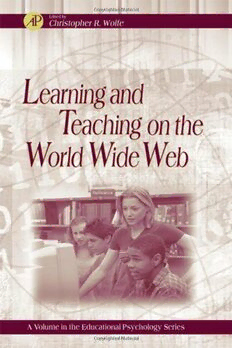
Learning and Teaching on the World Wide Web (Educational Psychology) PDF
286 Pages·2001·16.187 MB·English
Most books are stored in the elastic cloud where traffic is expensive. For this reason, we have a limit on daily download.
Preview Learning and Teaching on the World Wide Web (Educational Psychology)
Description:
This book is about using the Internet as a teaching tool. It starts with the psychology of the learner and looks at how best to fit technology to the student, rather than the other way around. The authors include leading authorities in many areas of psychology, and the book takes a broad look at learners as people. Thus, it includes a wide range of materials from how the eye "reads" moving graphs on a Web page to how people who have never met face-to-face can interact on the Internet and create "communities" of learners. The book considers many Internet technologies, but focuses on the World Wide Web and new "hybrid" technologies that integrate the Web with other communications technologies. This book is essential to researchers is psychology and education who are interested in learning. It is also used in college and graduate courses in departments of psychology and educational psychology. Teachers and trainers at any level who are using technology in their teaching (or thinking about it) find this book very useful. Key Features* Distinguished authors with considerable expertise in their fields* Broad "intra-disciplinary" perspective on learning and teaching on the Web* Focus on the Web and emerging Web-based technologies* Special attention to conducting educational research on-line* Emphasis on the Social and Psychological Context* Analyses of effective Web-based learning resources* Firmly grounded in contemporary psychological research and theory
See more
The list of books you might like
Most books are stored in the elastic cloud where traffic is expensive. For this reason, we have a limit on daily download.
